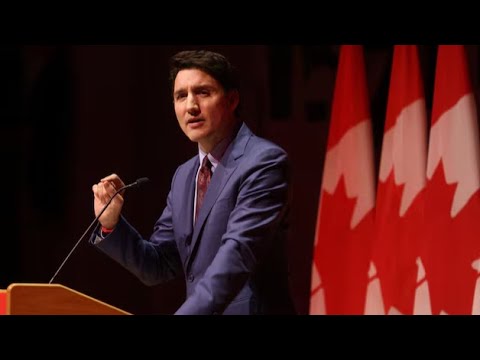|
Getting your Trinity Audio player ready...
|
Justin Trudeau Reportedly Poised to Resign Amid Mounting Political and Public Pressure
Edited by: TJVNews.com
Canadian Prime Minister Justin Trudeau is reportedly preparing to resign from office as early as Monday, according to a report by the Globe and Mail, and extensively covered by Fox News Digital. The anticipated resignation comes amid plummeting approval ratings, a series of political setbacks, and growing frustration over Canada’s economic and social challenges.
According to the information provided at Fox News Digital, the exact timing of Trudeau’s resignation remains unclear, but the decision is expected to be announced before the national Liberal Party caucus meeting on Wednesday. Trudeau, who has been serving as Prime Minister since 2015, now faces a moment of reckoning as public dissatisfaction continues to grow across Canada.
As the report at Fox News Digital highlighted, Trudeau’s resignation rumors come at a time when his approval ratings have hit record lows. A recent poll by Angus Reid, cited by Fox News Digital, revealed that 68% of Canadians disapprove of Trudeau’s leadership, with only 28% expressing support. These dismal numbers paint a stark picture of public sentiment as Canada approaches a national election scheduled for October 20, 2025.
Key issues plaguing Trudeau’s government include a persistent housing crisis, stagnant per-capita GDP growth, and unrelenting inflation. These economic strains have eroded public confidence in Trudeau’s administration and his ability to address Canada’s most pressing problems.
Trudeau’s potential resignation comes after enduring a series of political blows over the past few months. As Fox News Digital reported, Trudeau narrowly survived a no-confidence vote in September brought forward by the Conservative Party of Canada. While he managed to hold onto power, the vote underscored deep divisions within parliament and mounting discontent among legislators.
Adding to his political woes, Finance Minister Chrystia Freeland, once considered a loyal ally, announced her resignation from Trudeau’s cabinet on December 16. In a candid resignation letter, Freeland cited irreconcilable differences with Trudeau over Canada’s fiscal direction, stating that leaving the cabinet was the “only honest and viable path.”
“For the past number of weeks, you and I have found ourselves at odds about the best path forward for Canada,” Freeland wrote, according to Fox News Digital. She further highlighted the need to preserve fiscal resources for potential economic crises looming on the horizon, including a possible tariff war.
Further intensifying the pressure on Trudeau is Jagmeet Singh, the leader of the New Democratic Party (NDP), who announced plans to introduce a formal motion of no-confidence on January 27. Singh’s declaration, as reported by Fox News Digital, signals a growing consensus among political factions that Trudeau’s leadership may no longer be sustainable.
“No matter who is leading the Liberal Party, this government’s time is up. We will put forward a clear motion of non-confidence in the next sitting of the House of Commons,” Singh declared. This motion threatens to further destabilize Trudeau’s already fragile hold on power and could potentially force an early election.
In addition to political and economic crises, Trudeau has faced mounting criticism over his public behavior during times of national unrest. As Fox News Digital reported, Trudeau sparked controversy in November when he was spotted dancing at a Taylor Swift concert in Toronto while violent riots unfolded in Montreal.
The optics of Trudeau’s attendance at the concert while Montreal faced destructive protests drew sharp rebukes from both political opponents and members of the public. Don Stewart, a Member of Parliament representing part of Toronto, criticized Trudeau on X (formerly Twitter), writing:
“Lawless protesters run roughshod over Montreal in violent protest. The Prime Minister dances.”
Stewart continued, calling for a return to “law and order, safe streets, and communities in the Canada we once knew and loved.”
While Trudeau later denounced the riots as “appalling,” the damage to his public image had already been done.
Trudeau first became Prime Minister in 2015, riding a wave of optimism, progressive ideals, and promises of transparency and inclusivity. His early tenure was marked by significant social reforms, including legalizing recreational cannabis and advancing LGBTQ+ rights. However, the latter half of his leadership has been overshadowed by economic struggles, political scandals, and growing polarization across Canadian society.
As the report at Fox News Digital emphasized, Trudeau’s departure—if confirmed—will mark the end of an era in Canadian politics. His resignation would not only reshape the Liberal Party’s leadership but also set the stage for a high-stakes election battle later this year.
If Trudeau does resign, the Liberal Party will face the urgent task of selecting a new leader capable of repairing the party’s fractured image and addressing Canada’s pressing economic and social issues. Meanwhile, the Conservative Party and the New Democratic Party are likely to intensify their campaigns to capitalize on Trudeau’s departure and present themselves as viable alternatives to lead the nation.
As reported by Fox News Digital, Trudeau’s resignation—if confirmed—would mark a significant turning point in Canada’s political landscape. Whether his departure is framed as an act of political self-awareness or an inevitable consequence of dwindling public support, it will undoubtedly leave a lasting imprint on Canadian history.




